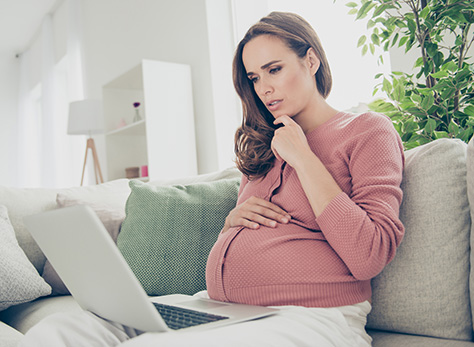Tommy’s charity leads challenge on Government over miscarriage support
UK leading pregnancy charity Tommy’s launches new tool to care and support women who’ve experienced miscarriage

A calculator developed for use in clinics by experts in miscarriage is now available for women and pregnant people across the UK, helping them understand their chance of a successful pregnancy and access personalised advice on tests, treatment, and lifestyle changes.
Developed by Tommy’s National Centre for Miscarriage Research, the Tommy’s Miscarriage Support Tool is designed to reassure, guide, and empower women and birthing people who have had 1 or more miscarriages as they consider a next pregnancy or are in the early stages of pregnancy.
The tool – available through a website on phone, tablet, or desktop - asks for age, BMI, polycystic ovary diagnosis, number of previous miscarriages and number of previous live births to accurately determine the probability of a successful next pregnancy.
It's based on an algorithm developed by the Tommy’s National Centre for Miscarriage Research and University of Warwick that uses data collected in the Tommy’s NET database from 1,800 women who have participated in miscarriage research studies.
Used in Tommy’s recurrent miscarriage clinics, the model has also been tested and performed accurately at 4 other UK miscarriage clinics with other data sets.
Extra information entered into the tool, such as ethnicity and smoking status, does not contribute toward the calculation of healthy pregnancy, but helps shape the resulting personalised supportive information and advice, which is backed by research and developed by Tommy’s researchers and midwives.
Tommy’s Miscarriage Support Tool has been designed to provide hope and encouragement to women and pregnant people who may have been discouraged by previous experience of loss, while also empowering them to advocate for their care.
Treatment and testing access varies across different parts of the UK, with women in some parts of the country not offered the care they are entitled to. The tool’s goal is for everyone, everywhere, to have the easily accessible up-to-date advice and support they need for their current or future pregnancy.
Alongside written advice, women, and pregnant people whose results show them to be at higher risk of miscarriage will be offered 1:1 support with a Tommy’s health professional to discuss concerns and care options.
Deputy Director of the Tommy's National Centre for Miscarriage Research and Professor of Obstetrics at the University of Warwick, Siobhan Quenby has overseen the tool’s development and uses it with patients in her recurrent miscarriage clinics. She says:
“In my experience, parents often feel so anxious after their miscarriage experience that it’s difficult to have the confidence to try again. This fantastic tool gives information and support to help them as they consider a next pregnancy.”
Sharon Dhliwayo, who was part of the support tool user testing group, has previously experienced a miscarriage, a stillbirth, and a pre-term birth. She says that the tool is “very empowering”.
“If your GP hasn’t offered you a test or treatment, you can now ask because you know.”
Dr Ria Clarke, obstetrician, and member of the support tool advisory board, says that the tool is "absolutely something that you would want to use if you’ve had miscarriages. If this tool was available, it would have avoided a lot of Googling. It gave more support than I expected.”
Tommy’s Miscarriage Support Tool has been created by Tommy’s – the UK’s largest charity funding research into stillbirth, premature birth, and miscarriage - with support from the Tampon Tax Fund, a government scheme allocating funds generated from the VAT on sanitary products to projects that improve the lives of disadvantaged women and girls.